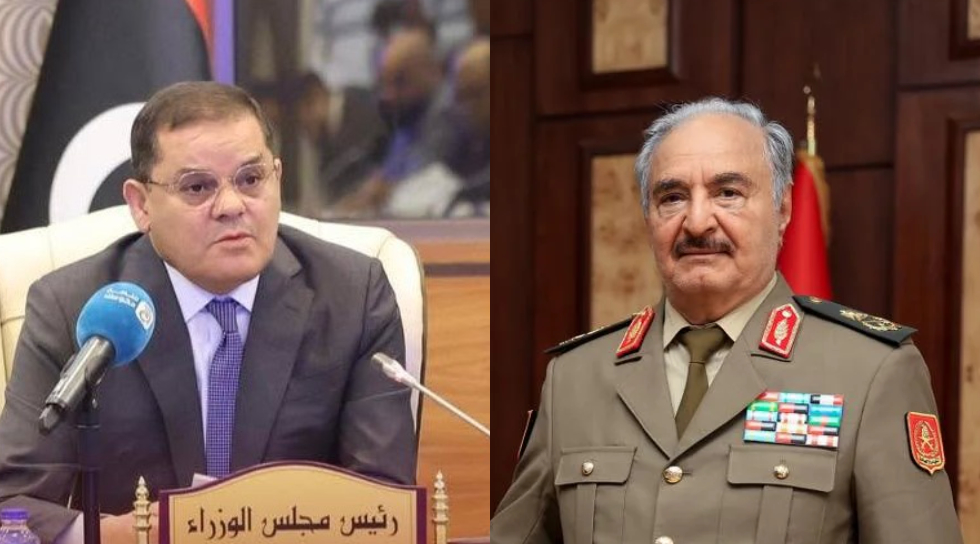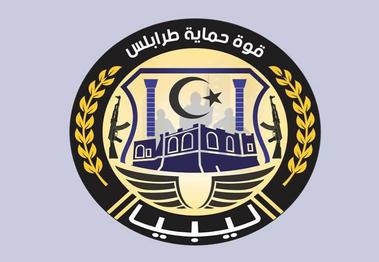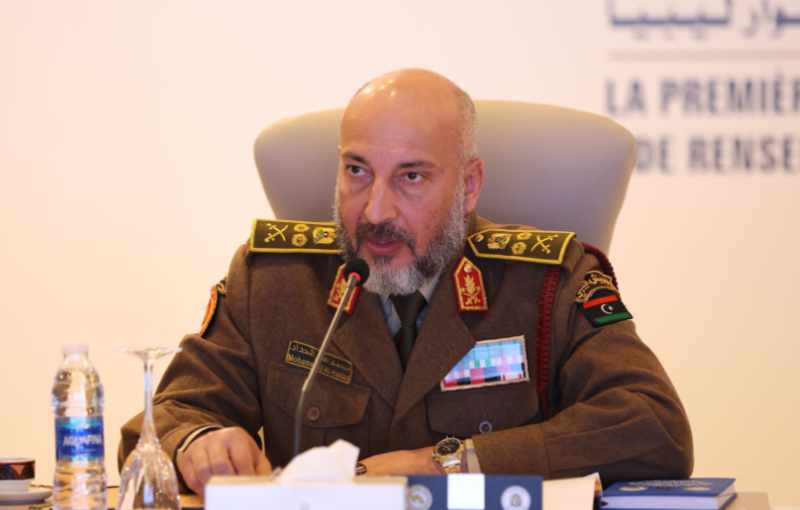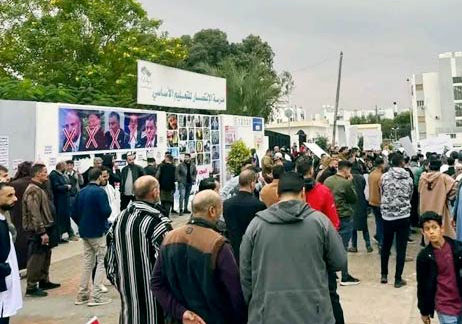Libya: Incumbents reject UN roadmap and instead prioritise self-interest
Published on 2025 October 6, Monday Back to articles
Abdelhamid Dbeibah (L) and Khalifa Haftar (R)
Libya’s political trajectory remains stalled because its two dominant political actors — the east’s dominant strongman Khalifa Haftar and the Tripoli-based internationally recognised Government of National Unity (GNU) — continue to separately articulate positions that undermine key pillars of the electoral roadmap proposed by the UN special Envoy, Hannah Tetteh, presented to UN Security Council in August.
The real dispute between the main political forces is a struggle for power rather than a constitutional one. Leaders in both the east and west are seeking to protect their own interests by obstructing consensus on an electoral basis. It is generally acknowledged that the solution is not more transitional phases but a national political will that compels all parties to respect the electoral process. Haftar and Prime Minister Abdelhamid Dbeibah’s parallel but differing rejections of the UN approach demonstrates a deep-seated desire among incumbent elites to control the terms of the political transition. This places them in direct confrontation with international mediation efforts and the aspirations of the Libyan public. If the elite’s monopoly is not broken, there will not be elections no matter how many initiatives there are.
Haftar calls for a ‘national Initiative’ and rejects ‘foreign-woven’ roadmaps
On 3 October the Libyan Arab Armed Forces’ (LAAF) commander, Khalifa Haftar, issued a strong rejection of externally dictated political solutions, and urged Libyans to seize the initiative to define the country’s future.
During a meeting with tribal elders, notables and wise men from the Eastern, Central and South-Eastern regions, he asserted that ‘a map whose threads have been woven behind borders cannot build a free fully sovereign state.’ He called on all segments and institutions of Libyan society to find a ‘model formula’ that could pull the nation out of the ‘vortex that is spinning it in an orbit of vacuum and taking it towards the unknown.’
Haftar emphasised self-reliance using the proverb, ‘no one scratches your skin like your own fingernail,’ and added that Libya ‘is the home of the Libyans, and they are its people, and only its people protect the home.’ He stressed that it has become a Libyan society’s historical responsibility to find a model formula to rescue the country’ from its current state.
Haftar expressed hope that this meeting would serve as a ‘ beginning of goodness’ and a ‘starting point towards organised community action,’ aimed at transitioning from the current state of confusion, disarray, division, fragmentation, conflict and lack of trust to a stage of permanent stability and peace for the one state of Libya. He described this desired state as one of freedom, dignity, law and institutions. He specified that this process must include ‘all cities and all segments of society’ so that it may gain its legitimacy directly from the people. He pledged that the LAAF would be present to protect and defend it.
Finally, Haftar encouraged Libyans to actively participate in ‘drawing the roadmap to build their state themselves.’ He said that the thousand-mile journey begins with a single step and called for the meeting be the first step to complete the entire journey and the bold national initiative that drives Libyans and urges them to actively participate in drawing the roadmap to build their state themselves.
Dbeibah seeks to delay elections and solidify power
Meanwhile, on 2 October Dbeibah met the High Council of State’s (HCS) chairman, Mohamed Takala, to discuss joint measures and arrangements to ensure political stability and coordinate efforts. They also reviewed several vital files of national concern to achieve integration and enhance institutional work affirming enhanced cooperation between the two. This followed Dbeibah’s meeting the previous day with the Presidential Council chairman, Mohamed al-Menfi, when they discussed political and security developments and affirmed support for the committee tasked with monitoring the stability agreement and activating the institutional framework for implementing it.
These meetings reveal the GNU’s core strategy: institutional entrenchment as a means of prolonging its mandate and deflecting international pressure for immediate comprehensive elections. Its public objection to a presidential election — citing the lack of an agreed constitutional basis — is a defensive component of this strategy. By prioritising legislative elections and a lengthy constitutional reform process — which contradicts the UNSMIL roadmap — the GNU would effectively delay the high-stake poll that could immediately remove Dbeibah from power.
These coordinated meetings are the offensive component. By discussing political stability, institutional integration, and critically important security arrangements in Tripoli, the GNU is determined to solidify its authority. If successful, its alignment with the HCS and Presidential Council, will create a powerful cohesive front among Tripoli’s internationally-recognised bodies, reinforcing the perception of the GNU as a functioning administration capable of maintaining security and addressing national files.
This institutional consensus is meant to validate the GNU’s continued governance and strengthen its hand against calls for a new unified interim government. Ultimately, it is interpreted by critics and the public as a struggle for power aimed at protecting the political elite’s interests and obstructing the democratic process by delaying the end of the transitional phase.
The GNU continues to obstruct any change that removes it from office. This is widely perceived as an attempt to prolong its mandate, arousing fears that the ballot box as the sole path to ending the chaos of endless transitional phases will not be given a chance.
The real dispute is a power struggle rather than a constitutional one. The political forces controlling eastern and western Libya are seeking to protect their interests which, in turn, obstructs any agreement on the elections. The widely-held consensus is that the solution does not lie in more transitional phases but in a national political will that compels all the incumbent parties to respect the electoral process.
This excerpt is taken from our Libya Politics & Security weekly intelligence report. Click here to receive a free sample copy. Contact info@menas.co.uk for subscription details.


